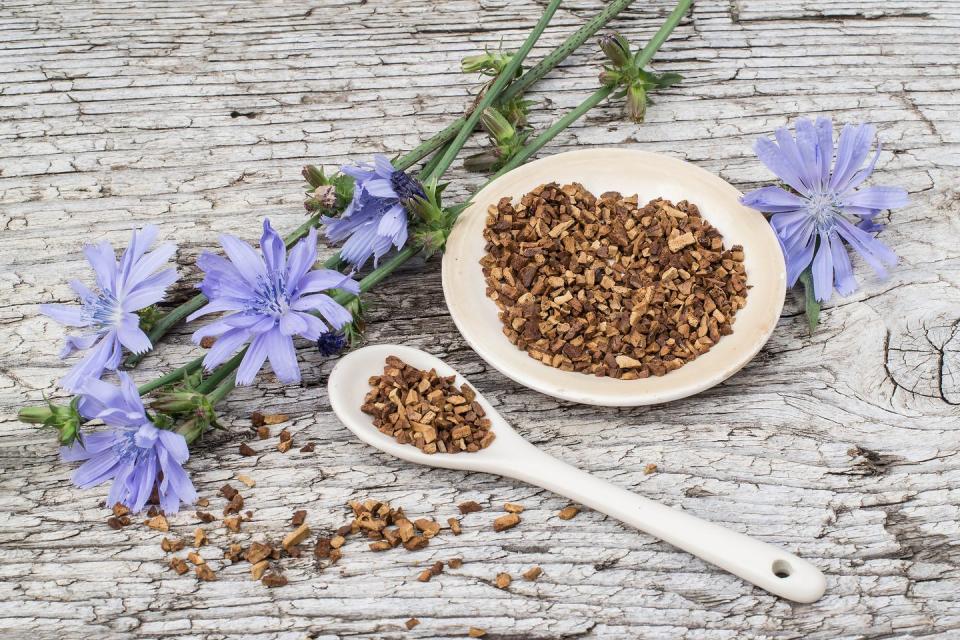If You're Looking to Cut Down on Your Caffeine Intake, You Need to Try Chicory Root Coffee

Down in the New Orleans French Quarter, after all the late night concerts and parties have died down on Bourbon Street, you're bound to find locals and tourists unwinding at Café du Monde with the city's famous post-jubilee eats: beignets and chicory coffee.
The combo is nothing short of delightful. The sweet, flaky sensations of fried dough dusted in sugar mixes well with the warm, nutty (almost woody) accents of the dark brew. While beignets have been a popular American delight for some time now, chicory root coffee has only really caught on in the past few years. The Big Easy, however, has embraced chicory — for its taste and its health benefits — ever since the late 19th century.
It's deep in their colonial history. The French, who once owned the territory, harvested the roots of the blue-flowered chicory plant to make teas and medicines to treat jaundice, liver enlargement gout, and rheumatism.
Naturally, the colonizers brought their traditions with them, but chicory coffee didn't become a thing until the American Civil War. Union naval blockades cut off coffee imports from to the city. This forced New Orleanians to be creative when it came to getting their coffee fix. They started mixing chicory root into their coffee to stretch the supply, and sometimes they would just brew the root on its own. The grounds were cheap and tasted similar enough.
Today, there's certainly enough coffee to go around and there's no need to ration and mix. But are there still reasons to add chicory to your coffee other than taste? Health science says, maybe. The nutrient content in chicory brews is usually low, so it might be better to eat it instead. In that case, we've rounded up five ways chicory root can enhance your well-being as well as other ways you can add it to your diet.
But first a warning: Research says people who are allergic to ragweed or pollen should avoid this plant since it belongs to the dandelion family. Other studies claim that chicory is also risky for women who are pregnant or breastfeeding. So consult your doctor before you give chicory a try.

The Health Benefits of Chicory Root
It can improve your digestive health.
Say goodbye to constipation. Chicory root is rich in inulin fiber which can help your food more easily pass through your digestive tracts. Inulin is also a prebiotic that can encourage the growth of healthy bacteria for a happy gut.
It will help you feel full while reducing calories.
Since inulin is a soluble fiber that holds water, it can be used as a low-calorie option to replace fat in certain recipes. There are some studies that say that chicory can help lower blood sugar and treat diabetes as well. Soluble fiber in general is known for its ability to decrease the glycemic index in foods and lessen insulin resistance.
It could potentially improve brain function.
Chicory contains manganese and vitamin B6, which are essential nutrients for your noggin. Manganese is a vasodilator with anti-oxidative properties that helps to improve blood flow to the brain as well as fight free-radicals. It can also increase the speed that electrical signals pass through the brain to improve overall brain function. Vitamin B6, on the other hand, is a vital nutrient needed to create certain neurotransmitters in the brain.
It may help to treat osteoarthritis.
Chicory has anti-inflammatory qualities that some scientists say can treat osteoarthritis. In one study, participants took an oral supplement, but people have also used it topically to treat swelling. Chicory's effectiveness in reducing inflammation is still in question, however. Most studies looking at its anti-inflammatory properties have been done on animals. More research with human participants is needed to make a fair conclusion.
It could help you cut down on caffeine.
Let's be real: Brews solely made with chicory will not give you that caffeine high. But if you're a person who just loves the taste of coffee and doesn't want the jitters, a chicory brew might be for you. Another option is to mix chicory with a small amount of coffee to at least reduce the amount of caffeine you consume in one cup.
How You Can Add Chicory to Your Diet
You don't just have to drink coffee to reap the benefits of chicory. In fact, you might find chicory root fiber in many low-fat/high-fiber products such as protein bars, ice cream, cereals, breads, and more.
In terms of whipping up your own recipes, try adding this fiber to your:
Yogurts
Smoothies
Baked goods
Homemade granola bars
And if you don't want to add it to your dishes, you can always find chicory root supplements either online or at a health food store near you. Just make sure your doc gives your supplement choice a thumbs up before you start incorporating it into your diet.
You Might Also Like

